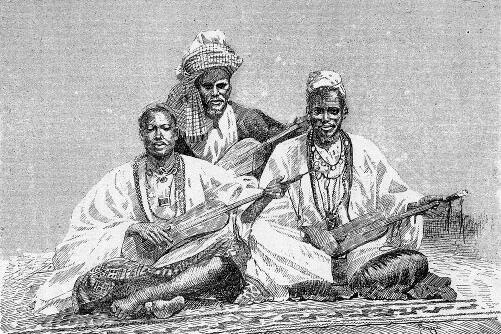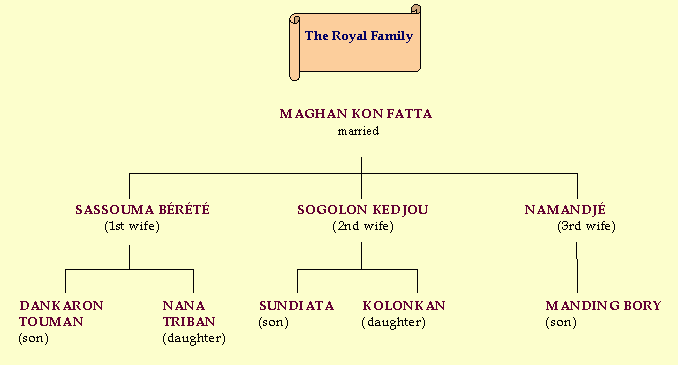The Hero's Journey: Sundiata
Interview with Edan Dekel
This interview with Edan Dekel analyzes the Sundiata epic through the lens of the Hero's Journey.
Storyteller
How was the epic transmitted?
How do we know about Sundiata Keita, the historical person?
How is the epic transmitted in African languages today?
Although the oral poems of the people of Mali are our best source of information about Sundiata, we have independent evidence of his life and reign through Arab travellers such as the great Ibn Batutta who visited Mali in 1352. However, even Ibn Batutta claims that Sundiata lived more than a hundred years before his visit, so we must assume that his sources were also part of the oral tradition.
Today, the story of Sundiata is found not only among his native Mandinka people, but throughout the entire Mandingo language group which is spoken in Guinea, Burkina Faso, Mali, Senegal, and Gambia. The main vehicle for the transmission of this story is the professional bard called the griot or, more properly, the jali. The jali is trained from childhood in the art of oral poetry. Within the Sundiata story itself, the jali Balla Foureke plays an important role as adviser to the king and as the keeper of the royal memory. The modern jali does not have a king, but he still serves the same memorializing function in the community.
Birth
Sundiata gets his power through his mother and to a lesser extent his father. How is his pedigree mythically established?
How important was family in medieval African society? Compared with today?
How does Sundiata's pedigree reflect the co-existence of traditional religious beliefs and Islam?
Family life and genealogy play a central role in medieval African society as depicted in the Sundiata story. Political alliances are often determined by ancestral ties between royal families, and intermarriage between kingdoms serves to bind separate communities into a larger familial group. The genealogy of the ruling king is preserved in detail through the jali, and he is often called upon to recite the entire history of the royal family on important ceremonial occasions and especially before great battles.
Although Sundiata's genealogy is based in West Africa, the origins of the family are traced back to Bilali Bounama, the first muezzin and companion of the prophet Muhammad. Like most medieval Muslim dynasties, the Mali emperors linked themselves to the prophet's family or with someone near them. Thus Sundiata is tied both to his ancestral land in Mali and to the newer religion which had spread through northern Africa.
Call
At the beginning of each of the three main "movements" Sundiata is driven to act in order to right a social/political transgression. What calls the hero to take action?
What can we infer about social norms and/or beliefs in Mali from these transgressions and from Sundiata's responses?
Given the supreme importance of family in Mali, it is quite appropriate that the great Lion King's first great act is motivated by an insult to his mother, Sogolon. The story of Sundiata's first steps is forever linked to his desire to defend his family honor, and this reinforces the primacy of family above every other association. Just below family in the hierarchy of values is personal destiny. Sundiata is destined to rule Mali as a great king, and when his position is usurped through the scheming of his step-mother, he bravely accepts his exile because he knows that he will ultimately return and fulfill his foretold destiny. Closely allied with the desire to achieve one's predetermined goal is the need for stability in the kingdom. When Sumanguru conquers Niani and assumes control, he upsets the normal balance of power in the region and oppresses the people greatly. Sundiata must wage war against the evil king in order the restore the freedom of the people and reestablish the hereditary kingdom.
Tests
What are the qualities of a hero revealed during the tests?
How does the contrast between Sundiata and Sumanguru communicate the characteristics of good and bad leadership?
Sundiata is always depicted as the ideal leader. He is brave and surrounds himself with other brave warriors and wise councilors. He is also generous and provides for all his dependents. There is a story told about him that he scours the bush and even steals in order to provide for his griots, and that when they are starving in the desert, he even cuts off a piece of his own flesh and cooks it for them. This dedication inspires supreme loyalty in his subjects. They are willing to die for him, because they know that he would do the same on their behalf. In contrast, Sumanguru represents the worst type of king. He is cruel, secretive, and unfaithful to his kin. His oppressive natures forces even his own nephew to fight against him. The triumph of Sundiata over Sumanguru can be understood as a lesson in good kingship.
Helpers & Tools
Where does the hero's power come from?
Who does the king depend upon to achieve and maintain power?
As we have already noted, family is the most important institution in Mali. Sundiata depends first and foremost on his family. His mother, Sogolon, serves as his first teacher and protector; his half-brother Manding-Bory is his boon companion and chief lieutenant; and his sister Nana reveals the secret of Sumanguru's totem and thus ensures Sundiata's victory. The king also depends on his jali for sage counsel and examples from the lore of his ancestors. Finally, Sunjata relies on ancestral ties with neighboring kingdoms in order to assemble an alliance large enough to defeat Sumanguru. Subordinate to family, griots, and ancestral allies are various soothsayers and sorcerers whose power and advice are often suspect, as we see from their failure to achieve the objectives of queen Sassouma and later of Sumanguru.
Return
What does the hero accomplish?
What was the relationship between the ruler of the Mali Empire and the leaders of the various smaller kingdoms?
The elaborate alliance assembled by Sundiata in order to wage war against Sumanguru demonstrates the deft political skill required of a great emperor in Mali. Only a forceful personality commanding great respect is capable of bringing together so many differing factions in support of one common cause. Because he is successful in his mission, Sundiata has the privilege of redistributing the kingdoms to their rightful heirs after the defeat of the usurper Sumanguru. He is recognized as the emperor of Mali by the subordinate kings, but he is not their overlord. Rather, his superiority is one of rank and dignity rather than actual political power. The kingdoms are bound together by mutual needs and especially by ancestral ties.


